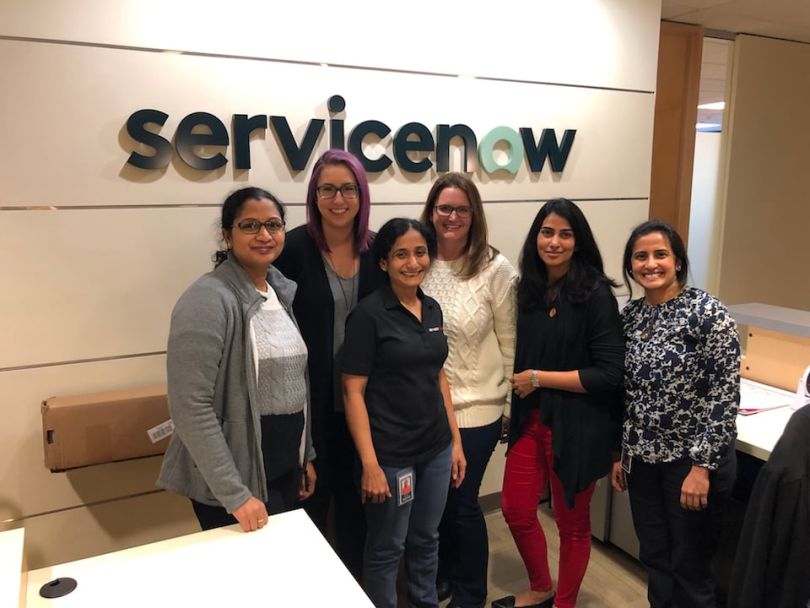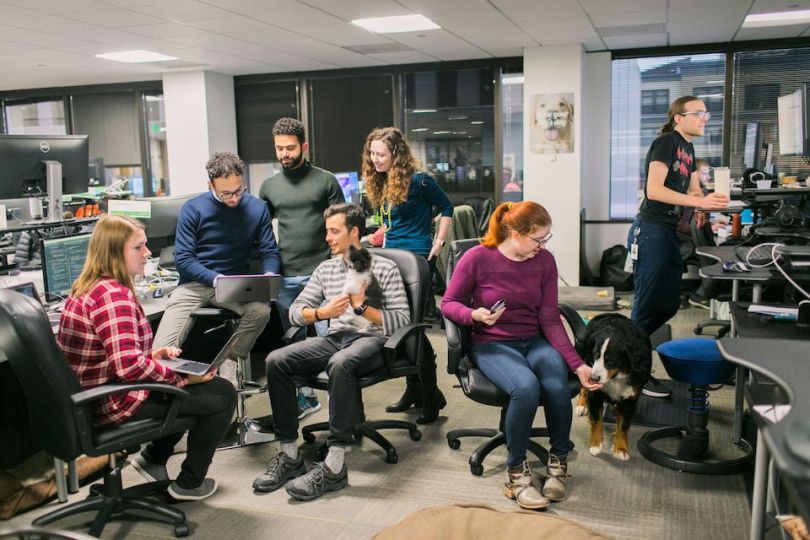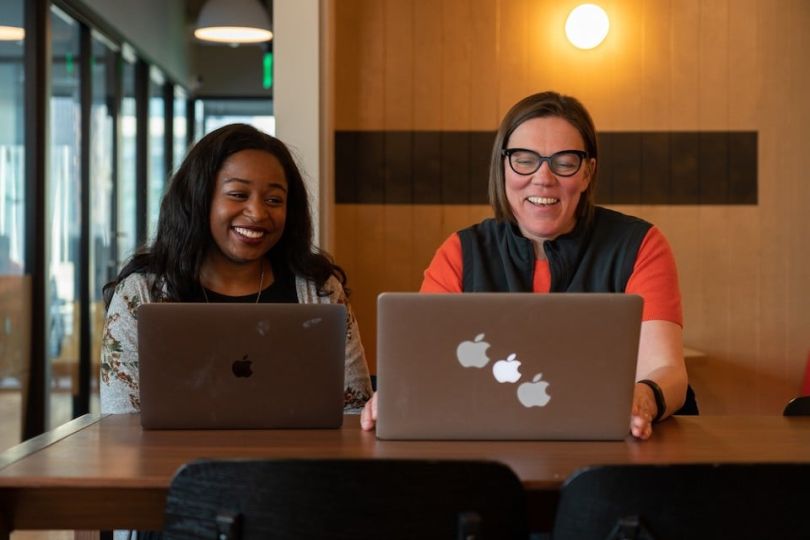While the tech industry loves to talk about gender equality in the workforce, women still face significant barriers to job opportunities, promotions and venture capital when compared with their male peers. All-male leadership teams and a “boys club” company culture can create an unwelcoming workplace environment for engineers who aren’t men, ultimately perpetuating a cycle of gender inequality where angsty navel-gazing is an easier alternative to real action.
In part one of a two-part series, we spoke with four Seattle engineers — at all stages of their careers — about how they found their way into the tech industry, the challenges they faced and what lessons they might have for other women following in their footsteps.

Silicon Valley-based ServiceNow arrived in the Northwest in 2014, opening its Kirkland office at Carillon Point. The company's cloud-based workflow management and collaboration software is designed to boost productivity and send projects smoothly from one team to the next.
Quality Assurance Manager Sri Vattikuti said coding has now become a life skill, regardless of which professional path you choose.
Share the story of how you got into engineering.
I grew up in India. When I went to college in the 1990s, the tech revolution was starting to take hold there. I was attracted to technology in the beginning because it just seemed cool. Working on computers was not common or integral to our lives at that point, and I found it really fun. As I got deeper into studying coding, I realized the critical role it plays in our everyday lives — mostly without us even knowing. So, I got my master’s and turned my excitement into a career.
Take a computer class, a software class, a coding class — even if you don’t make a career out of it, it will give you a better understanding of how things work.”
What is the biggest challenge you've faced in your career, and how have you worked to overcome it?
As a working mother, my biggest challenge has been juggling work and home. Fortunately, I have had managers who understand the challenges of a young family, and each time I went back to work after maternity leave, they gave me a lot of support. When you work in IT, it’s pretty easy to work from home when needed, and my managers have always trusted me to balance work and family, whether I was in the office or remote.
Any advice or tips for other women in engineering?
I think coding has become a life skill now, no matter what career you choose. But it can be more daunting for women to explore engineering as a career because other fields are more often romanticized as better choices for us. My advice is this: Don’t doubt yourself — just try it. Take a computer class, a software class, a coding class. Even if you don’t make a career out of it, it will give you a better understanding of how things work. No matter your background, no matter your interests, you can learn. It’s only scary until you try it.

Rover connects dog owners with dog walkers, sitters, daycares and groomers. The Belltown-based company, which has acquired two companies and raised well over $300 million since it was founded in 2011, provides its services in a huge number of cities throughout Canada and the United States.
Data Engineering Technical Lead Kendra Iverson started her career in the navy, until she was forced to find something new.
Share the story of how you got into engineering.
I didn’t originally plan to work in engineering but discovered it by gaining more knowledge and technical skills throughout my early career. When engineering found me, I was ready. I am a political science major who graduated from the Naval Academy expecting my career would begin and end as a naval aviator. Unfortunately, a medical issue sent me out into the business world barely understanding how pivot tables worked in Excel and entirely unaware of the world of engineering.
I started in defense contracting, manually reconciling payments where I Googled around until I found ways to streamline the process with VBA. I parlayed that into an analyst role at Amazon where I needed to learn SQL, and where I learned my first lesson in jumping in even if you don't feel ready. Using those newly minted SQL skills, I made the move to an analytical role at Rover in 2014.
As we grew as a company, a data engineering role on the tech team opened up, and while I wanted to apply, I counted myself out of the running because I thought I didn’t have the necessary skills. Fortunately, another technical role opened up later, and I was regretful enough for not applying the first time around that this time I jumped at it — and I got the job! Because I felt like such an imposter in the role, I spent extra hours every week learning everything I could for the job. A year later, I was promoted to tech lead. Now, I’m on the management path and I love what I do.
Do your best to represent yourself and your achievements, and if there’s a skill they need that you don’t currently have, consider it a negotiation point — not a blocker.”
What is the biggest challenge you've faced in your career, and how have you worked to overcome it?
I am generally my most significant hindrance to advancing in my career. I have stopped myself from applying for a job or raising my hand to be considered for the next level because I wasn’t a master at the full list of qualifications. I would delay my own advancement based on a set of requirements that no one person was ever likely to have. I have been lucky to have colleagues be a champion for me. However, I am now focusing on being my own champion. If I want to do something, I now think of the value I can bring.
For example, I have strong project management skills. In Rover’s earlier days that was very valuable for the tech team, and more than made up for my weaker coding skills. Those skills gave me cross-team visibility and exposure to more opportunities than if I had not taken that first risk.
Any advice or tips for other women pursuing a career in engineering?
Do your best to represent yourself and your achievements, and if there’s a skill they need that you don’t currently have, consider it a negotiation point — not a blocker. If you’re willing to commit to learning that skill, give them a timeframe for it and then don’t give up until you achieve that goal. You’ll gain a reputation in the organization that will allow you to progress to other roles because you have a proven track record of being successful. Rover has been an amazingly supportive environment for this kind of growth, and if you’re at a place where they don’t value that diversity, don’t be afraid to move on.

DomainTools’ platform forms part of businesses’ and security solution firms’ cyber protection frameworks. The company links a network’s domains and IPs with just about every domain on the internet, and uses those connections to build risk assessments, profile perpetrators of cyber intrusions, map cyber activity to an attacker’s infrastructure and even help to guide fraud investigations.
With a last name like hers, it was only a matter of time before Security Researcher Emily Hacker realized she should give up the newspaper game and get into cybersecurity.
Share the story of how you got into engineering.
My path into engineering was a winding one. In college, I studied English rhetoric and communications with the intention of becoming a newspaper reporter. I worked at the local city paper for a while toward the end of my college career and quite enjoyed it, but decided that it wasn’t quite what I wanted to do forever. Knowing I was good at writing and interested in technology, I briefly went into technical writing, where I eventually landed on a team of cyber intelligence analysts as their report writer.
While working with them, I realized that I enjoyed the research they were doing and the cybersecurity aspect of their jobs. I quickly began picking up various aspects of their job including research and analysis, until my company took notice and promoted me to the role of a full-time intelligence analyst. Now, after several years of working in cybersecurity, I’ve discovered that research engineering combines the right mix of my skill set and ambitions.
Don’t minimize the value of your non-technical skills.”
What is the biggest challenge you've faced in your career, and how have you worked to overcome it?
One of the biggest challenges I’ve faced in my career is having to prove my value despite having a non-traditional educational background for my field — especially as a woman. In the past, I’ve worked with various men who have non-technical degrees or no degrees, but who are seen by management as just as valuable as their peers. As a woman, I’ve been told in previous jobs that I shouldn’t expect to advance far in my career because I majored in English.
However, I have worked to overcome this by continuing to provide value and prove my worth. I have attended and taken as many training classes as I can, I have acquired certifications and I produce quality products in my job. Additionally, I have been fortunate to find a company that values my skill set and recognizes the value of a non-traditional background.
Any advice or tips for other women pursuing a career in engineering?
Don’t minimize the value of your non-technical skills. My time spent studying and working in journalism taught me valuable research and analytical skills, not to mention writing and communication skills. These skills are invaluable, not only in a business sense but in solving engineering problems as well. Having a diverse workforce — including diverse skill sets and backgrounds — is imperative to creating an effective and efficient team.

By measuring customer interactions and interests along with broader trends — and applying their handy machine learning algorithms — Quantcast says it can predict the behavior of individual consumers. Brands, publishers and marketers use the San Francisco company’s platform to adapt their messaging for those individuals in real time as they move through the internet.
Staff Software Engineer Katya Rogers recommends finding companies staffed with people you would hang out with outside of work and that work on problems that interest you.
Share the story of how you got into engineering.
As a child, I was exposed early on to STEM subjects and encouraged to pursue a career as a scientist. After obtaining my M.S. in applied mathematics in Russia, I came to the United States and completed my Ph.D. in computer science at Dartmouth College. A key to my success in computer science was having a strong support network.
Be fearless and choose a company that will allow you to be fearless.”
What is the biggest challenge you've faced in your career, and how have you worked to overcome it?
The biggest challenge for me is balancing the constant desire to learn and grow with life in general. It is easy to be comfortable, and when I find myself at that point, I look for opportunities for work that will challenge me.
Any advice or tips for other women pursuing a career in engineering?
Be fearless and choose a company that will allow you to be fearless. Look for a company that provides a voice to each member of the team, has people you would hang with outside of the office and enables you to work on problems that interest you.







